
Women's softball infielder Haruna Sakamoto, 31, works in Toyota Motor Corporation's Production Control Division.

※The article has been published in Toyota Global Newsroom on March 1, 2019.
Women’s softball infielder Haruna Sakamoto, 31, works in Toyota Motor Corporation’s Production Control Division.
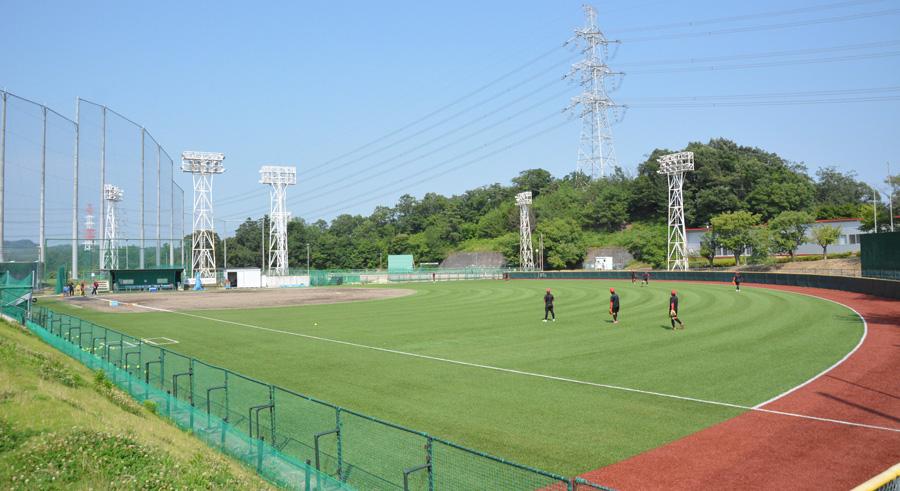
In response to our pre-interview questionnaire, Toyota's women's softball infielder Haruna Sakamoto, who dons jersey No. 3, wrote to us: "I've never really felt any setbacks."
Sakamoto, who, since graduating from high school, has been playing corporate-league softball for 13 years, must have run into some type of setback or challenge, even if only a small one. With that on our minds, we set out to meet Sakamoto on June 25 at the Toyota Sports Center, the site where she practices daily.
Baseball first, softball second
Sakamoto first took up sports when she was in her fourth year of elementary school. She joined a boys youth baseball team of which her friend, a boy, was a member.
“I played baseball straight through to junior high. Because I mixed in with a team for boys, I was often not able to play in official games. But that didn’t bother me. I simply and purely had fun playing baseball,” said Sakamoto.
Sakamoto became absorbed in baseball. After entering high school, she decided to test her strengths by undergoing the selection process for the Women's Baseball World Cup, through which her talent landed her a spot on the Japanese national team. But while still in high school, she decided to switch to softball.
“I had considered going to a high school that had both a women’s baseball team and a softball team. But, as I should have expected, I started to think about how it would be to leave home from high school age and live in a dorm. Doing both baseball and softball would probably have been too hard. At the time, as a girl who wanted to aim for the future, softball was much more of a major sport [for women] than baseball. So, I went to a high school in Osaka that was strong in softball,” explained Sakamoto.
Greatest strength as a player
While still attending high school, Sakamoto was scouted out. Her first corporate team position came from Toda Chuo General Hospital in Saitama Prefecture. She played there for three years, but the team was unable to win. During that time, Sakamoto experienced playing in a first-league/second-league promotion/demotion series.
“I wonder if one could say that was a setback,” Sakamoto said somewhat nonchalantly as she recalled that experience.
But Toyota women’s softball General Manager Akane Nakanishi, who had experienced the frustration of not being able to win in her own days on a team as a player, put it this way: “Fifteen years ago, Toyota wasn’t a strong team. So, I understand the frustration of not winning. As Sakamoto has gone through a promotion/demotion series, I think she had a very hard time. But I think that experience is what gave her what she has today.”
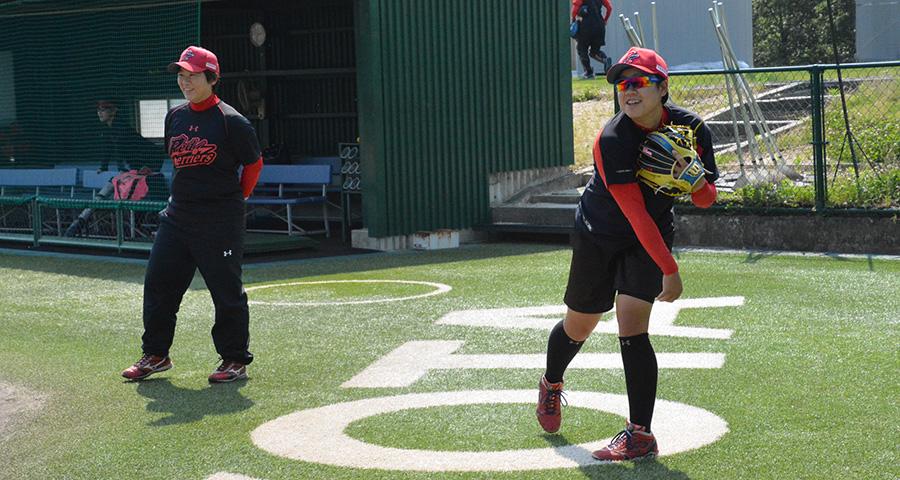
We once again asked Sakamoto about those days. Instead of talking about tough times, though, she objectively explained the differences between her former team and her current one.
"Like now, when I'm on a strong team, winning becomes a matter of course. You can only erupt in jubilation at the very end of the tournament. And it's like, if you don't win the final, then all your victories up to that point have no meaning. Each ball. Each game. The accumulation of it all. The joy of winning. I keenly felt such things in those days when it was hard to win," said Sakamoto.
If it were another person, such an experience would spell frustration. But not for Sakamoto. Coach Asako Mabuchi, who joined Toyota at the same time as Sakamoto and was one of her long-time playing teammates, said this about Sakamoto's character: "She sometimes looks like she's depressed, but she's not one to be drawn down further. There's a part of her that doesn't like to lose, and she's always looking at things in a positive way. She's got the most vitality on the team (laughs)."
For Sakamoto, losing or failures are not setbacks, but are, rather, a form of energy for moving on to the next stage. We think that this is her greatest strength, as she battles on in a world of victory or defeat. So we started to understand why she didn't know how to answer our questionnaire about "setbacks".
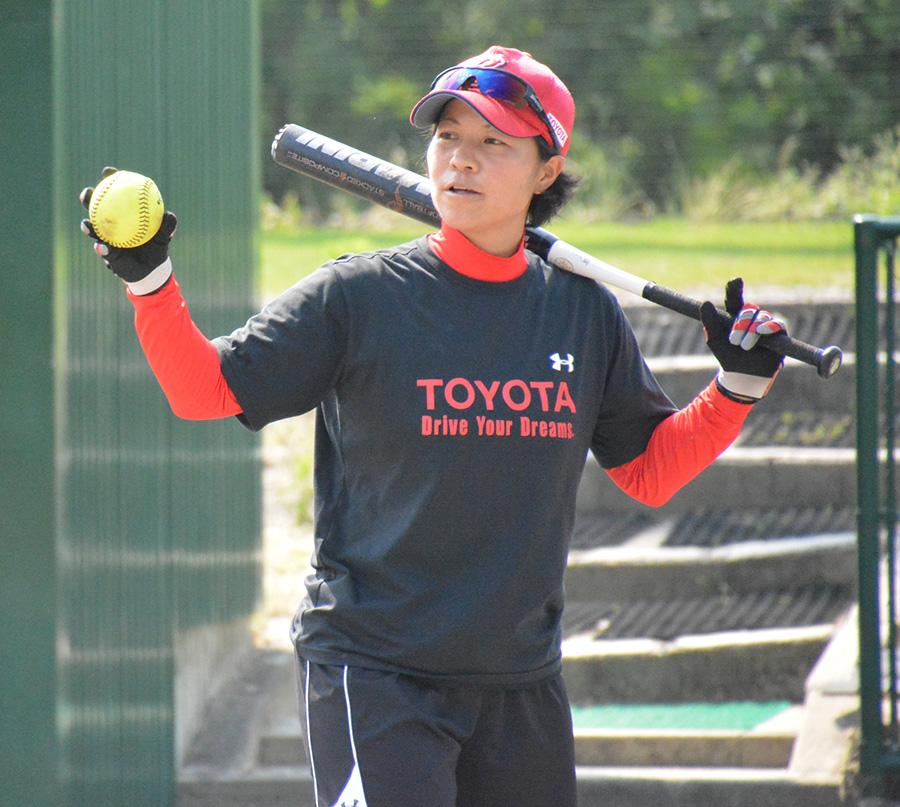
Two turning points
There were two turning points for Sakamoto. The first one came in 2008, when, in her fourth year on a corporate team, she transferred to Toyota. Her move was triggered by Itsushi Fukuda, who was the general manager at the time and who had approached her.
“Fukuda-san said to me: ‘If your current team drops to the second division, come our way!’ My junior high baseball coach had ties with Fukuda-san, and I began to think about transferring after Fukuda-san approached me,” said Sakamoto.
As it turned out, although Sakamoto’s team at the time was able to remain in the first division, Sakamoto still had a desire to switch to Toyota. “I wanted to play on a strong team to make me stronger. I had my sights set on making it to the all-Japan roster. My team at the time understood my aspirations,” explained Sakamoto.
Sakamoto achieved her goal, and, for eight straight years from 2009, she made the national team, even serving as captain in 2016.
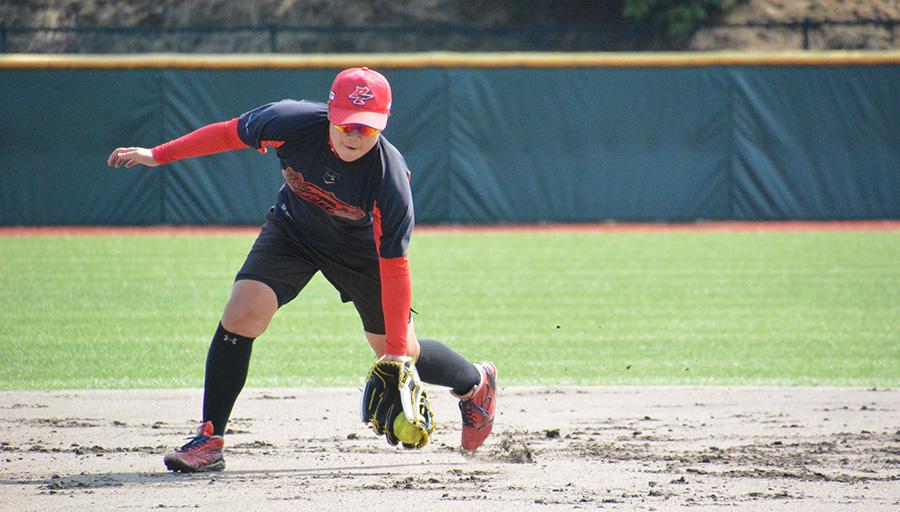
Her second turning point was when she met Natasha Watley.
Watley, who joined Toyota in 2009, was a driving force for the team as its top batter for eight years. She was a top-ranked player who had made the United States national team and earned a gold in the Olympic Games. She has since retired from direct competition and now serves as a coach.
“Although I knew that Tasha (as Sakamoto refers to Natasha) was a great player, I had no intent whatsoever in being bested by her. I asked her about batting, and I learned so many things from her by practicing together. Although she speaks in English, we are somehow able to communicate (laughs),” said Sakamoto. (According to one of Sakamoto’s team members at the office, Sakamoto took English conversation lessons when she was in elementary school and is, therefore, not exactly helpless when it comes to understanding English.)
Even language is no obstacle for Sakamoto. She will do anything to become stronger and to grow. Even trainer Shohei Inoue, who has long watched Sakamoto, said: “In any case, Sakamoto has guts.” We heard that, despite breaking a finger in the middle of a game, she continued playing all the way to the end.
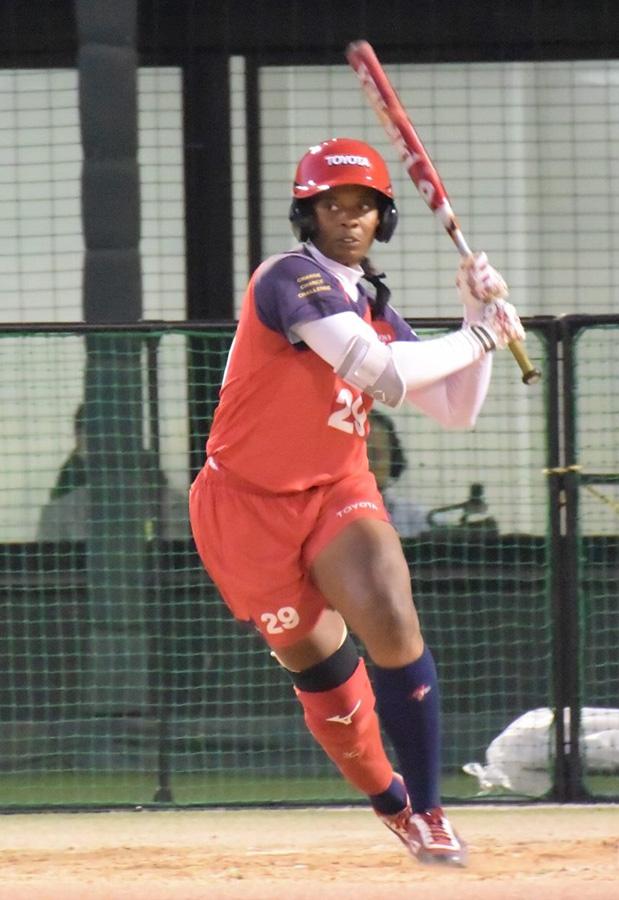
Venturing off to the U.S. professional league
During the off-seasons in 2013 and 2015, Sakamoto, with Watley serving as a go-between, ventured to the professional league in the United States for training.
“I had always told the team that I wanted to go to America. But, if it wasn’t for Watley coming to our team, I think that, realistically, it would have been difficult. In the professional world, even if you’re a super athlete, if your condition is not right, you get cut. I felt this even in my bones, so I had a strong desire to keep on performing well,” said Sakamoto.
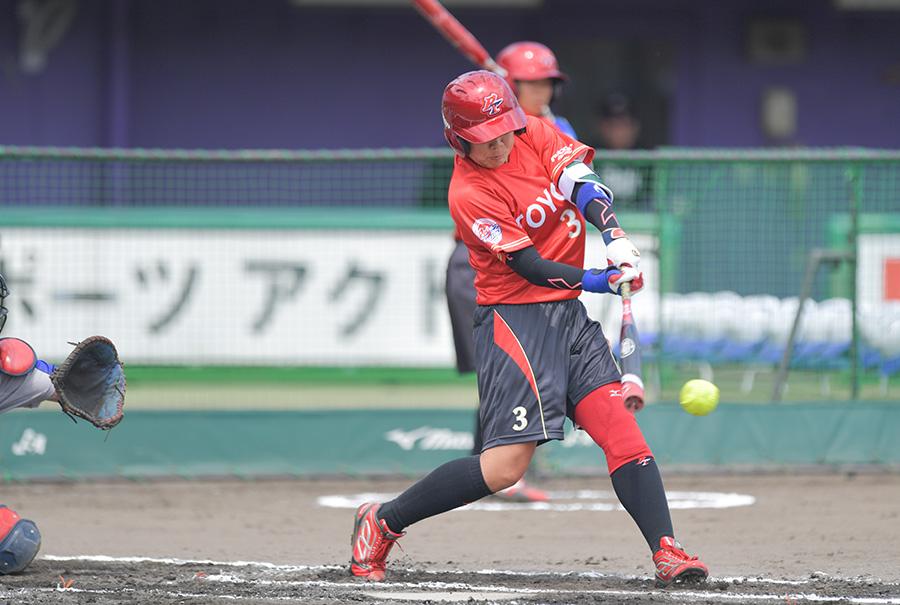
The consciousness of a professional had sprouted within Sakamoto. However, some things are easier said than done.
“I think, to perform well, preparation for getting into a game is important. You have to get your technique down before league games start. And then, before a game, you watch video footage of your opponent and study the data, so that you can approach practice with a clear image,” said Sakamoto.
What kind of mindset and preparation is necessary to enter a game? Even experienced players never forget about nor neglect to think about what you need to do. More than that, they constantly and consciously choose a path that will make them better. It is just this spirit of challenge that has made Sakamoto what she is today.
Turning attention to younger players
This year, Sakamoto relinquished her post as captain to No. 10 Haruna Furusawa.
Furusawa commented on the handover, saying, “After becoming captain, I understood, for the first time, the difficulty in having to oversee everything. I realized that until now I had only been focused on myself. I want to become like Sakamoto-san and all our other previous captains.”
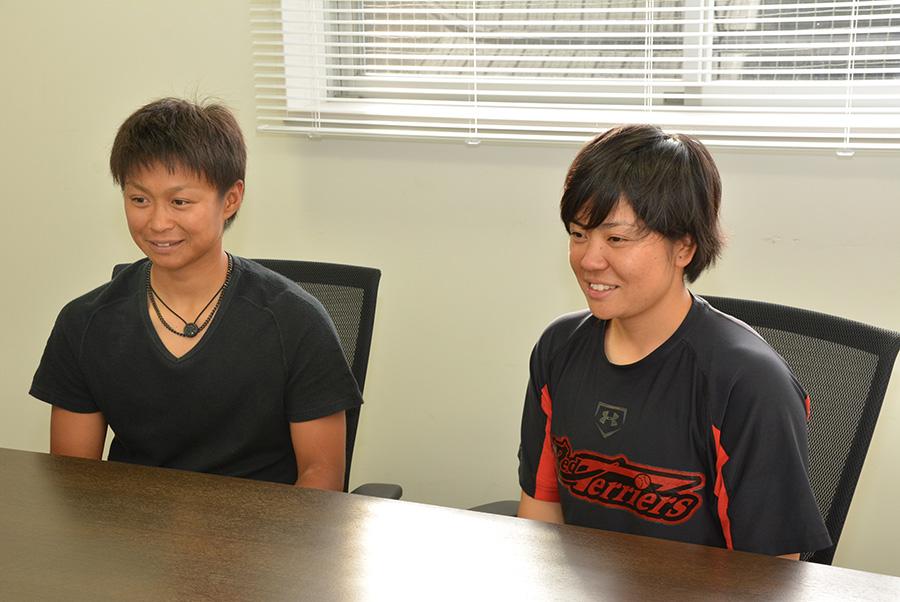
The change of captain came, in part, due to Nakanishi’s desire for Sakamoto to cultivate younger players.
The general manager said: “Ever since graduating from high school, Sakamoto has constantly been on the field, and she also has experience in world competition as part of the national team. Such experience is extremely valuable. I want her to take a step back and share her experience with younger team members. I want the young team members to absorb many things from Sakamoto, with a sense that they want to someday even be better than she is.”
All the other players and staff members were one in praising Sakamoto by saying that she is a player who knows her sport. In a pinch, she calmly judges the situation correctly, such as knowing exactly when powerful batting is needed. People say that her experience is essential to win in the finals.
Sakamoto fully understands what the general manager wants, along with understanding her own role. However, as one would expect, she hates to lose.
“I know I have to share what I know, and I want to do so. But I’m still an active player, so, even though they are my teammates, they are also rivals, aren’t they? Going up against each other, the better player gets to play. So, my feelings for not wanting to lose are strong,” said Sakamoto.
But she also has considerations for her juniors, who will one day be responsible for pulling the team forward.
“I want the younger players to approach me more aggressively. That would make my effort more worth it. I might have once been like them myself. But I want them to take it upon themselves to come to me, see and take.”
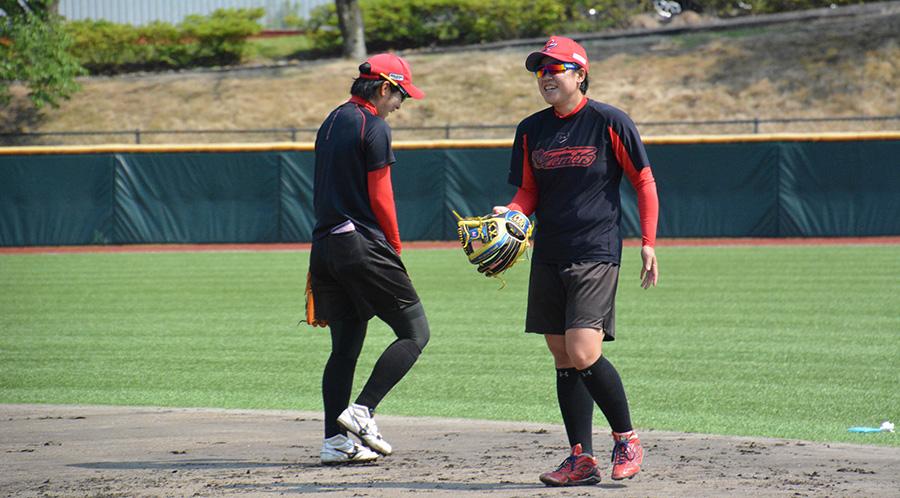
Hearing only this makes it sound like Sakamoto is a strict, more experienced player with the staunch pride of a craftsman. But No. 10 Furusawa and No. 5 Ayumi Suzuki told us that Sakamoto was like a Kansai (Osaka and nearby areas) comedian, mischievous, more shy than she looks and a person who always needs company. They said she pulls open curtains when teammates are changing clothes in the changing room and that she often pulls gags like a child. Said even Mabuchi, calling Sakamoto the team’s mood-maker: “In a good sense, she jokes around, or, rather, she says things that gets her teammates to relax, and she actually makes things fun. Her cheeriness helps the team.”
She leads the team forward with the way she plays. Outside of playing, she creates the team’s mood with natural cheeriness and humor. To her juniors, Sakamoto represents a good goal, a bar that they must clear.
*This article was originally published in Japanese on August 9, 2018.
Profile
Date of birth: December 12, 1986
Place of birth: Osaka Prefecture
Alma maters: Shijonawate Gakuen High School
Nickname: Mossan (by juniors close in age), Sakamocchan (by fans)
Family: Father, mother, older sister, younger sister (a sports family headed by her mother, who was a corporate team volleyball player)
Competition
Position: Infield (currently, second base)
Competition track record:
Student days: Played in 2002 All-Japan inter-high school competition
Played in 2004 National High School Women’s Baseball Championship
Played in 2004 National Sports Festival of Japan
As an adult: Five-time member of Japan Women’s Softball League Division 1 winning team, four-time member of All Japan Softball Championship winning team
National teams: 2004 Japan women’s junior national softball team
2009-2016, Japan women’s national softball team (member of 2012,
2014 Women’s Softball World Championship winning team; member
of 2010, 2014 Asian Games women’s softball Championship winning team)
Admired athlete(s): ‘Athletes Meeting’ members rugby player Toshizumi Kitagawa, baseball player Katsutoshi Satake, and women’s basketball’s Coach Yuko Oga (The Athlete Meeting is a group consisting of a few members from various Toyota divisions established by rugby player Toshizumi Kitagawa that gathers to discuss over meals how to enliven Toyota’s the sports divisions.)
Respected person: Professional baseball player Ichiro
Custom before every game: Putting on socks and spikes from the left foot first
Personal
Personality in brief: Impatiently “my pace”
Hobbies: Sleeping, drinking
Special skill: 4S (Sorting, Shifting, Shiny, Standardizing)
Childhood dream: To appear in the Olympic Games
Treasure: Family

